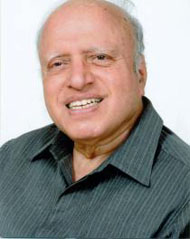jbrehm2, September 15, 2011 | View original publication
M.S. Swaminathan to open Heuermann Lectures
There will be food for thought and thought for food when Dr. M.S. Swaminathan, the world's first World Food Prize laureate, opens a new lecture series on meeting the world's growing food needs Monday, Oct. 10. Swaminathan will speak at 3 p.m. at the University of Nebraska-Lincoln's Hardin Hall, 33rd and Holdrege.
The participation of Swaminathan, known as the Father of the Green Revolution in India, comes at the invitation of University of Nebraska President James B. Milliken and the Robert B. Daugherty Water for Food Institute. In March 2011, Milliken and Swaminathan jointly hosted a symposium in Chennai, India, on managing water resources for food security, sponsored by the Indo-US Science and Technology Forum.
The new Heuermann Lectures in the Institute of Agriculture and Natural Resources at UNL are open to the public, made possible through a gift from B. Keith and Norma Heuermann of Phillips, long-time university supporters with a strong commitment to Nebraska's production agriculture, natural resources, rural areas and people.
"Predictions are that in the next 40 years, the world's population will require a doubling of food production globally, where at least 70 percent must come from efficiency-improving technology," said Ronnie D. Green, University of Nebraska vice president for agriculture and natural resources and Harlan vice chancellor, IANR.
"How we'll produce that increased food supply affects everyone. People need sound information to make thoughtful, well-informed decisions on what they'll support, and why. The Heuermann Lectures are a wonderful gift to the state of Nebraska to bring world leaders in the conversation about the security and safety of our food supply and natural resources to UNL on an ongoing basis for many years to come."
The world must find ways to sustain natural resources and produce renewable energy even as people talk of global climate change and its potential effects on animals, land and people, Green continued, adding there's also a need to secure the sustainability of rural communities where the vital work of producing food and renewable energy occurs.
"Ways we can provide security – and by that I mean enough to sustain us all, all around the world – in the areas of food, natural resources, renewable energy, communities and people, are the focus of this lecture series," Green said.
The inaugural lecture in the series will be presented by Swaminathan, whose topic is "Food Security in an Era of Price Volatility and Climate Change." A 2:30 p.m. reception at Hardin Hall precedes the lecture.
"Dr. Swaminathan is a great man who has had a remarkable career and enjoys a tremendous reputation around the world," Milliken said. "He is one of the giants of sustainable agriculture and rural development and has been a great partner with the University of Nebraska and the Daugherty Water for Food Institute. This is an opportunity for Nebraskans to hear from one of the true pioneers in agriculture."
A plant geneticist by training, Swaminathan received the World Food Prize in 1987 for introducing high-yielding wheat and rice varieties to India's farmers. The award often is described as the equivalent of a Nobel Prize in agriculture.
Swaminathan has been called a living legend, the father of economic ecology, and the catalyst of the green revolution movement in India between 1960-1982 that moved the country from having the world's largest food deficit to producing enough grain to feed all its people.
His advocacy of sustainable agriculture leading to an ever-green revolution makes him an acknowledged world leader in sustainable food security, and he is known for his significant contributions in promoting the knowledge, skills and technological empowerment of women in agriculture.
The recipient of 62 honorary degrees from universities that range from his native India to the Netherlands, and from Chile to the U.S., he has received 32 scientific awards and 31 international awards. Currently Swaminathan heads, in an honorary capacity, a research center for sustainable agriculture in Madras, India.
The second Heuermann Lecture features Dr. P. Stephen Baenziger, the first UNL scientist to hold the Nebraska Wheat Growers Presidential Chair, an endowed professorship through a licensing agreement between Nutech Ventures and Bayer CropScience.
Baenziger will speak on "Setting the Stage: Why Agriculture," at 4 p.m. Thursday, Nov. 10, in the Great Plains Room of UNL's East Union. A 3:30 p.m. reception in the East Union precedes the lecture.
Baenziger, who honors the work of scientists who've gone before him and describes himself as the current steward of the university's wheat-breeding program, has been working to help Nebraska growers improve their crops and help feed the world since he joined the university in 1986. He will discuss the importance of agriculture in our future.
The grains breeder in the Department of Agronomy and Horticulture in IANR, Baenziger is an honoree in the Nebraska Hall of Agricultural Achievement and recipient of the Nebraska Agri-business Club Public Service Award, the Crop Science Society of America Crop Science Research Award, the American Society of Agronomy Agronomic Achievement Award – Crops, and other awards, as well.
Recognized internationally for his work, Baenziger and the Director General are the only Americans serving on the 15-member board of trustees of the prestigious International Rice Research Institute.
The Heuermann Lectures will run monthly throughout the school year, with announcements on each speaker and topic prior to the lecture. On the Web visit HeuermannLectures.unl.edu.






